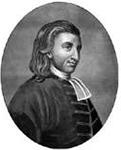 Time was when almost all the houses of Scotland numbered among their most prized possessions two books apart from God’s Holy Word itself. Seated on that place of honour by the inglenook with the fire’s reflection dancing on its covers reigned the true Word of God itself – the Bible. But in subordinate grandeur beneath the living truth of God sat those two princes – John Bunyan, and Thomas Boston.
Time was when almost all the houses of Scotland numbered among their most prized possessions two books apart from God’s Holy Word itself. Seated on that place of honour by the inglenook with the fire’s reflection dancing on its covers reigned the true Word of God itself – the Bible. But in subordinate grandeur beneath the living truth of God sat those two princes – John Bunyan, and Thomas Boston.
Thomas Boston was born on 17th March 1676 and died on 20th May 1732; but like so many before him – and like the “immortal tinker of Bedford” who shared that place of subordinate honour with him – being dead, he was to speak to many generations through the pages of his works. Born on 17 March 1676, indeed, but “born again” by the Holy Spirit of God in the summer of 1687. And it was this “second” birth that was to make many in his time, and after, rise up and call him blessed.
Like Matthew Henry, the young Thomas Boston was to be greatly influenced by his earthly father, a man who had known the prison cell for his non-conformity. And Thomas knew it, too, for many a time as a young boy, he tells us, he lay with his father in Duns’ jail “to keep him company”. However, in that summer of 1687 the pleasant air of religious liberty was once more being breathed in Scotland, and it was a thankful old John Boston who took his young son Thomas by the hand to attend on the ministry of good Henry Erskine, father of the famous Ralph and Ebenezeer. The text that was preached that day was the very warp and woof of the gospel of God’s saving grace, “Behold the lamb of God that taketh away the sin of the world”, and young Thomas Boston “beheld” and believed that the precious “lamb” had been slain for him. “I was like one amazed with some new and strange thing,” he recalls in his life story, and thereafter he was set himself to the task of exhorting others to “behold the lamb of God” that they might be “amazed”, as well, at this gift of God’s abounding grace.
Like many preachers both before and after him, however, Thomas Boston had some self-directed notions as to how he was going to conduct this ministry of calling men and women to Christ. Thus we find him full of complaints when the Lord places him in his very first charge in the parish of Simprin: “The Lord has brought about for me what I was most against,” he records. The stipend was small, the manse was large and dilapidated, and the Lord’s true people were few and far between. What a transformation, though, when “the lamb of God that taketh away the sin of the world” was beheld anew by preacher and people alike. “The Lord has brought about for me what I was most against,” the new young minister complains at the beginning of that ministry in that place; “Simprin!” he concludes his work there, “O blessed be He for His kindness at Simprin; “The lamb of God that taketh away the sin of the world.”
After almost eight years in that place Thomas Boston removed to the parish of Ettrick. As we think of Bunyan and Bedford, and McCheyne and St. Peter’s, and Rutherford and Anwoth, so it is Boston and Ettrick, for it was here that the one who had beheld “the lamb of God” spent his life’s labours. And labours they were! For eight whole years Boston exalted Christ in all His saving power, and yet, not one soul appears to have “beheld the lamb of God” in that time. Immorality, and all manner of sin was rampant in the area, and even some of those that Boston thought to have been “praying persons”, as he says, turned out to be “horrid swearers” when the occasion arose. “My heart is alienated from this place,” he told his wife; and when an invitation from another church arrived Thomas Boston was ready to flee from Ettrick. But the Lord’s ways are “in the seas”, and to Boston’s amazement, the news of this possible departure from Ettrick threw the whole parish into penitence before the Lord. Now, “the lamb” was to be beheld in that place as he had never been before – and indeed, all Scotland would glory in the exalted Christ as God took up His servant. From the pulpit of Ettrick one message flowed from the lips of the one who stood before the people – “Behold the lamb of God”.
When illness struck so that he could no longer stand, but had to sit in the pulpit to address the congregation, the message was the same. And from the window of the bedroom where his soul took its flight to be with the Lord, the same message proceeded; the same message recorded on the pages of that book nestling in the inglenook: “Behold the lamb of God that taketh away the sin of the world.”
From The Wicket Gate Magazine, published in the UK, used with permission.
